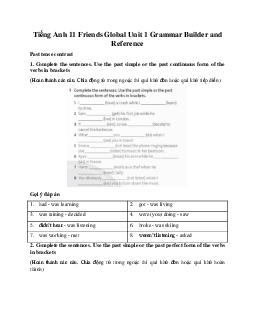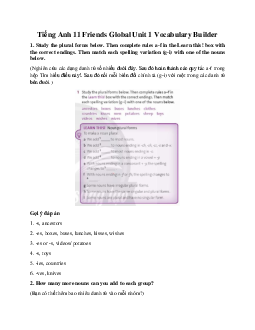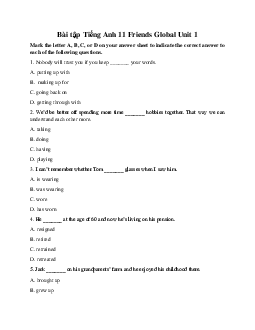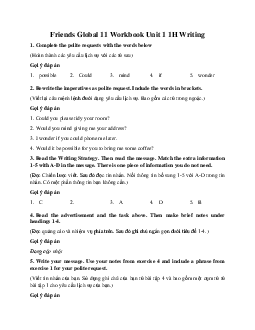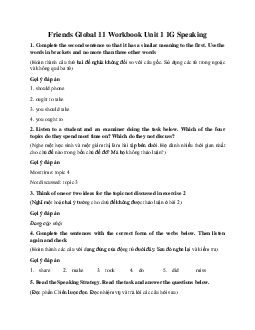





Preview text:
Tiếng Anh 11 Friends Global Unit 1 1G Speaking
1. SPEAKING Work in pairs. Look at the advert below. In your opinion, what
would be the best and worst things about spending a year with a family abroad? Use
the prompts below and your own ideas.
(Làm việc theo cặp. Nhìn vào quảng cáo dưới đây. Theo bạn, điều gì là tốt nhất và tồi tệ
nhất khi dành một năm với gia đình ở nước ngoài? Sử dụng các lời nhắc dưới đây và ý tưởng của riêng bạn.) Gợi ý đáp án
In my opinion the best thing about spending a year with a family abroad is that all of the
members have the opportunity to learn and speak a new language and visit different
places in another country. Moreover, the young generation can learn in a new educational
environment which brings more job opportunities for the future. In contrast, the worst
thing about spending a year with a family abroad is missing the place where we were
born and grown up. We will find it is strange to eat different food as well as experience
new cultures that we aren't used to.
2. Read the Speaking Strategy and the task above. Then match one or two of the
ideas below with each topic.
(Đọc Chiến lược nói và nhiệm vụ ở trên. Sau đó nối một hoặc hai ý tưởng dưới đây với mỗi chủ đề.) Gợi ý đáp án
• Getting to know your exchange student - doing hobbies together
• Useful things to take with you - carrying a dictionary
• Going to school in England - eating in the canteen - wearing a uniform
• Advice about staying with an English family - helping with housework - keeping your room tidy
3. Listen to a student doing the task from exercise 2. Does she discuss all the topics?
Which ideas from the exercise does she mention?
(Lắng nghe một học sinh thực hiện nhiệm vụ từ bài tập 2. Cô ấy có thảo luận về tất cả các
chủ đề không? Cô ấy đề cập đến những ý tưởng nào từ bài tập?) Gợi ý đáp án
She discusses all the topics. She mentions doing hobbies together, eating in the canteen and wearing a uniform. Nội dung bài nghe
Boy: So, did you have a good time in England?
Girl: It was great. I stayed with a really nice family. And I got to know my exchange student quite well.
Boy: Did you spend a lot of time together?
Girl: Yes, we did. We had similar hobbies. For example, we both liked playing
basketball, so we did that every weekend. It was good fun!
Boy: I hope I get on well with my exchange student. I’m going to stay with him next term.
Girl: You ought to find out about his hobbies. I think you should send him an email.
Boy: Yes, that’s a good idea. Maybe he likes tennis. I play tennis a lot.
Girl: Well, don’t forget to take your tennis racket with you. And anything else you need for your hobbies.
Boy: Do you think I should take some food from home with me? I’m worried that I’m going to miss it!
Girl: No, I don’t think you should do that. It’s easy to buy all kinds of food in the supermarkets in England.
Boy: What’s English food like?
Girl: It’s OK. At school, we had lunch in the canteen every day. The food was quite good.
Boy: What was the school like?
Girl: It was quite a small school. I was the only exchange student there. And everybody
noticed me, because I wasn’t wearing a uniform! But they were really friendly. And the
lessons were interesting, but they were all in English, of course. I had to concentrate really hard.
Boy: That sounds tiring.
Girl: Yes, it was. But you get used to it. Don’t worry!
Boy: Have you got any other advice for me?
Girl: Yes. You ought to take a present for the parents.
Boy: Oh, OK. What should I buy for them?
Girl: Just something small ... something for the house. Boy: OK. Good.
Girl: And remember to say ‘please’ and ‘thank you’ when you’re staying with them. The English are very polite!
Boy: Great. Thanks for the advice!
4. Read the Learn this! box. Then complete sentences 1-3 using the words in
brackets. Do not change the words, but add extra words if necessary.
(Đọc khung Learn this! Sau đó hoàn thành các câu 1-3 bằng cách sử dụng các từ trong
ngoặc. Không thay đổi các từ, nhưng thêm các từ bổ sung nếu cần thiết.) Gợi ý đáp án 1. ought to find 2. think you should send 3. ought to take
5. Listen again. Check your answers to exercise 4.
(Lắng nghe một lần nữa. Kiểm tra câu trả lời của bạn cho bài tập 4.)
6. SPEAKING Work in pairs. Student A is an English student who is going to stay
with Student B's family next month. Ask for and give advice about these topics.
(Làm việc theo cặp. Sinh viên A là một sinh viên người Anh sẽ ở với gia đình của sinh
viên B vào tháng tới. Yêu cầu và đưa ra lời khuyên về các chủ đề này.) Gợi ý đáp án
A: What do you think I should buy for your parents?
B: I think you should get some tea and coffee because my parents usually drink them in
the morning. I'm sure they will like it.
A: This is the first time I have come to Vietnam. How can I stay safe?
B: Don't worry. Vietnam is a peaceful country, so there is no war. You just need to
remember when you are walking on the street, be careful with your bags and your
personal belongings because sometimes there are pickpockets.
A: I understand. Should I prepare warm clothes when I stay with your family?
B: It is not necessary. Vietnam has a tropical climate, so the weather is not as cold as your country.
A: Well, how can I improve my language skills quickly?
B: As you know Vietnamese is one of the most difficult languages to learn. You ought to
learn some simple sentences about common topics in real life first, don't be shy to talk
with my family. That's a good chance for you to improve it gradually.
7. SPEAKING Work in groups. Read the task below. Think of two ideas for each
topic and make notes. Then do the task.
(Làm việc nhóm. Đọc nhiệm vụ dưới đây. Nghĩ ra hai ý tưởng cho mỗi chủ đề và ghi chú. Sau đó làm nhiệm vụ.)
Imagine the following situation: you spent three weeks with a host family when you
did a language course in England last summer. You are having a video call with a
student from Japan who is planning to do the same thing this summer and you are
giving him/her some advice. Discuss the following topics.
(Hãy tưởng tượng tình huống sau: bạn đã trải qua ba tuần với một gia đình bản xứ khi
bạn tham gia một khóa học ngôn ngữ ở Anh vào mùa hè năm ngoái. Bạn đang gọi điện
video với một sinh viên đến từ Nhật Bản đang có kế hoạch thực hiện điều tương tự vào
mùa hè này và bạn đang cho anh ấy/cô ấy một số lời khuyên. Thảo luận về các chủ đề sau.) Gợi ý đáp án
A: This summer I am going to have a language course in England with a host family. Can
you share with me some experience because I have never studied abroad before.
B: Sure! I think you should prepare some presents for the England family, for example
tea, coffee or wine… I'm sure they will be happy. Moreover, your small personal
belongings should be brought to try to avoid making them annoyed. Don't forget to be tidy and disciplined.
A: Yeah, I will do it. What are the benefits of studying in England that you can have?
B: That language course brings me a lot of advantages. Firstly, I can improve my English
skills significantly because I can have a good environment to practice. Secondly, studying
abroad helps me gain more confidence and independence because I have to do everything alone.
A: Sounds interesting! What should I do if I miss my family so much?
B: I used to think that. Don't worry, every day you ought to spend at least 30 minutes
making a video call for your parents to tell what happened to you every day. If you feel
alone, chat with your close friend to share your experience. These are two helpful methods, I think.
A: How can I stay safe during the time I study there?
B: In my experience, you ought not to keep all your money in one location In case you
forget or lose it. I don't think you should go out at night to a dark or non-tourist area. It is very dangerous.
